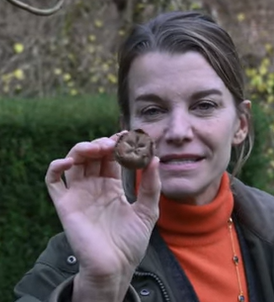
Medlars were a very common and useful fruit particularly in the Medieval and Early Modern period. They come out in December but can only be eaten when they are rotten and ‘bletted’. They also store well. They, therefore, provide a source of winter sweetness when there were few other fresh sources available.
They are from the Rosaceae family which includes apples, pears, rosehips and quinces. The English called them ‘open arses’ or ‘dog’s arses’ or ‘granny’s arses’ because of the way they looked until the more polite French name the Medlar caught on.
Shakespeare uses both words and uses their sexual connotations as they were thought also to look like female genitalia. A medlar was also a name for a prostitute. So in Romeo and Juliet this speech by Mercutio to Romeo and their mates contains some very bawdy thoughts:
If love be blind, love cannot hit the mark.
Now will he sit under a medlar tree
And wish his mistress were that kind of fruit
As maids call medlars when they laugh alone.
O, Romeo, that she were, O that she were
An open-arse and thou a poppering pear!
RJ 2.1.33
I think you can also see how good Shakespeare was at making his allusions available to all classes. For the sophisticated he begins with the reference to the French medlar and in case the groundlings are missing out throws in the ‘open-arse’ so they know what he is alluding to.
Medlars fell out of favour in the 18th and 19th Centuries. For more on medlars have a look at British Food history https://britishfoodhistory.com/2017/11/12/forgotten-foods-7-openarses/
Or watch this video from ‘the American Viscountess’ from which I extracted the picture of the medlar above.
Discover more from And Did Those Feet
Subscribe to get the latest posts sent to your email.

We call them ‘nèfles’. I never tasted them…
I must try!